
Some students and teachers part of the Harmony Project. Photo courtesy of Devon Sherwood
For neurodivergent students like Alex G., music can be life changing.
Alex’s mother said she noticed a significant change in the 17-year-old, who also has ADHD, since he’s been in music classes.
He is currently a senior at Franklin High School and said this is the first time he has ever taken an art class at an LAUSD school since he was in elementary.
His mother said he has been more engaged with school and has been better able to express himself and wonders whether he, by being deprived of arts education, “missed out.”
Alex G is part of a lawsuit that accuses LAUSD and its superintendent, Alberto M. Carvalho, of misusing $76.7 million in Prop. 28 funds dedicated to art and music education.
One organization, not part of the recent lawsuit but whose goal is to make sure that fewer students are missing out on music education in their lives, is Harmony Project, which provides free music classes to students in underserved communities.
“Music can help the brain; it can help students focus; it can help their reading and math skills…music is able to bring people together. We work with a lot of communities where music is something that people come together for,” Maya Barrera, Harmony Project’s chief program officer said. “There's a rich history of music and community building in the Latino culture; it transcends barriers that historically marginalized communities face.”
To make sure that fewer students are missing out on music education in their lives, Harmony Project provides free music classes to students in underserved communities.
What began as a grassroots initiative offering a free music education program for 36 students gathered in a small room within the walls of a local church in Hollywood, has now grown to be one of the most impactful music education nonprofits in Los Angeles and Southern California.
The Harmony Project, a music education nonprofit that provides free music instruction, academic support and social services to nearly 4,000 K-12 students in underserved communities in L.A., stemmed from a single idea in 2001. Today, 82% of the program's students are Latinos.

Today, 82% of the Harmony Project students are Latinos. Photo courtesy of Devon Sherwood
At that time, a group of philanthropists, including Margaret Martin, came together with the hopes of creating spaces where kids and young adults could study, practice and perform music—spaces that are harder to find in under-resourced communities.
Throughout the years, school districts have reduced the amount of class time, faculty and curriculum dedicated to the arts and music. Barrera said that music is often seen as an “extracurricular,” as something “that takes the back seat.”
Barrera said although making music and musical instruments more available to different students in L.A. is one of the Harmony Project's biggest visions, the program is more than space to learn about music.
Through an in-school and after-school program at 49 sites, including schools, community spaces or organizations, the Harmony Project not only provides students with musical instruments and music lessons on topics like songwriting, jazz, mariachi, guitar and drums, but it also aims for a holistic approach to student success—providing a full range of social, emotional and educational support.

The Harmony Project was founded in 2001. Photo courtesy of Devon Sherwood
“If a kid is hungry, worried about something or going through something external, it will be hard for them to even think or enjoy anything regarding music,” Barrera said when talking about the project’s holistic and wrap-around services.
CARE is a resource offered through Harmony Project in which the primary goal is to support students and their families or caregivers with non-musical resources, one-on-one support including referral services, community resources, student/family advocacy, know your rights training, parent workshops and self-care, as well as mental health resources, among other things.
One of the biggest parts of the program is also helping students be college-ready. Barrera said many of the schools they service, some of which include LAUSD campuses, often have only one college counselor for the whole school.
The Harmony Project also helps students with their college and FAFSA applications, visits college campuses and hosts writing or resume workshops.
According to Barrera, the organization relies on approximately 70 peer mentors and 120 professional instructors who they employ to make sure students have equal access to opportunities to make music or the resources needed to thrive in college.
“We have statement writing workshop classes, FAFSA educational workshops, and of course, this is offered across many languages so that it is accessible for all. The college access piece is really important,” Barrera said. “Last year, 99% of our students graduated high school on time, 98% of them were accepted into college and 72% of them are first-generation college students.”
Today, the Harmony Project services communities like South L.A., Compton, Hawthorne and Glendale, among other neighboring cities. In Compton, the Harmony Project provides beginning and intermediate band classes, along with musicianship and music production courses.
In South L.A., the Harmony Project operates three orchestras, as well as wind and string ensembles with students of schools such as Manual Arts Senior High School and the EXPO Center, a City of Los Angeles Department of Recreation and Parks facility. Their Leimert Park program also focuses on developing musicianship skills and applying those skills to instruments—including beginning band ensemble, drumline group classes, music production and piano classes at Audubon Middle School. At the Crenshaw High School program, the Harmony Project partners with the Crenshaw Band Program to provide students with instrumental music classes and other resources.

The Harmony Project provides students with musical instruments and music lessons on topics like songwriting, jazz, mariachi, guitar and drums. Photo courtesy of Devon Sherwood
According to Barrera, the first step in forming partnerships with various schools, school districts or community organizations is to ascertain whether the program can complement and enhance existing music and art initiatives in the area.
“We look at what's happening in the after-school programs. We look at what other community organizations are around and we start seeing, are there music programs, are there enrichment opportunities? How can we intentionally plug it in to sort of supplement whatever's happening in the school day and after-school programs?” Barrera said. “For example, in one of our partnerships, we learned that there was an existing Oaxacan band already there. So we got a grant to service that school; we didn't want to take away from that Oaxacan band. We wanted to enhance what they're doing and offer complementary services. We rely a lot on the community to tell us what is needed or what is already happening.”
A University of Southern California, Los Angeles study, published in the journal Frontiers in Psychology, concluded the impact of music education for adolescents extends beyond a surge in neural connections in their brains. It boosts their well-being.
In 2023, researchers administered anonymous, online surveys to 120 students from 52 LAUSD middle schools. The survey questions covered the key domains of positive youth development, including competence and confidence.
The Harmony Project serves 4,103 students from under-resourced communities across an area covering 120 square miles in L.A. To find a service area near you and to register, please visit https://www.harmony-project.org/interest.

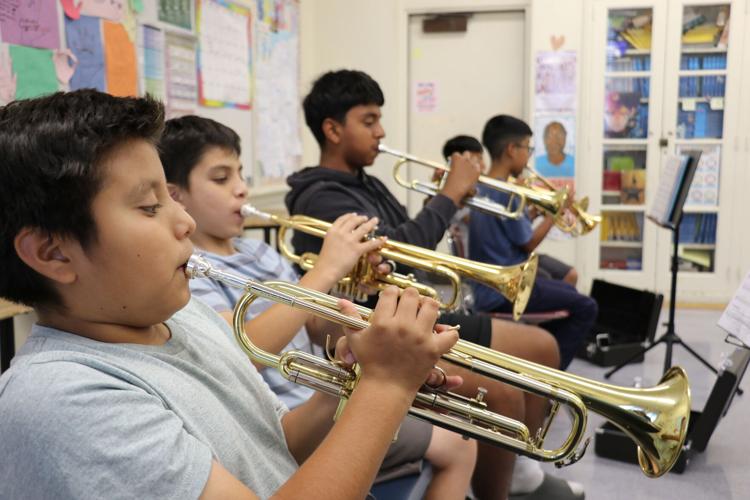
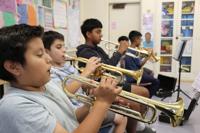

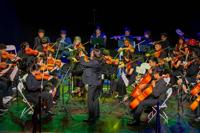

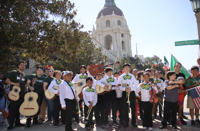

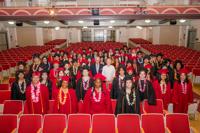





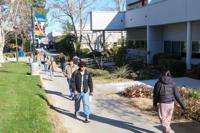

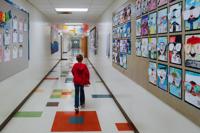
(0) comments
Welcome to the discussion.
Log In
Keep it Clean. Please avoid obscene, vulgar, lewd, racist or sexually-oriented language.
PLEASE TURN OFF YOUR CAPS LOCK.
Don't Threaten. Threats of harming another person will not be tolerated.
Be Truthful. Don't knowingly lie about anyone or anything.
Be Nice. No racism, sexism or any sort of -ism that is degrading to another person.
Be Proactive. Use the 'Report' link on each comment to let us know of abusive posts.
Share with Us. We'd love to hear eyewitness accounts, the history behind an article.